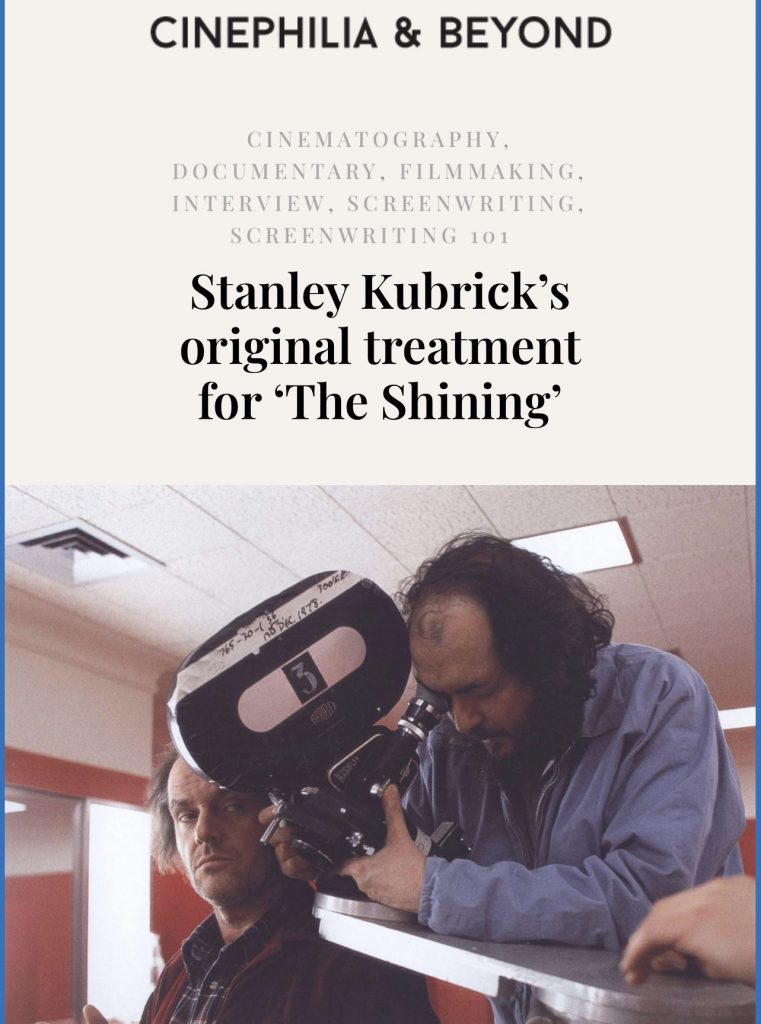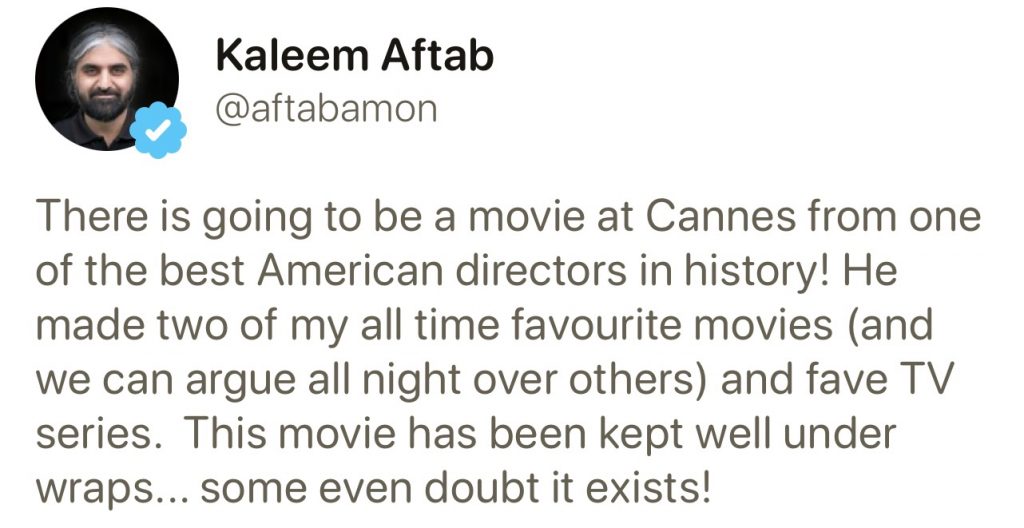
Daily
Never Thought I’d Post a Hannity Interview
But the Sean Penn discussion, which happened three days ago, is worth a listen.
What Were Michigan Jurors Saying?
Jurors in the Gretchen Whitmer kidnapping case today acquitted two militant rightwing Michigan bumblefucks — Brandon Caserta and Daniel Harris — and said they were deadlocked on charges against two others, Barry Croft and Adam Fox.
The jurors seemed to be saying that these low-rent assholes were just rattling their online sabres, and that they didn’t actually intend to kidnap Whitmer. Not really.
All four had been accused of plotting to snatch Whitmer, Michigan’s Democratic governor, from her vacation home in 2020. You could also presume that the jurors felt a greater cultural kinship with these four louts than with Whitmer.
The bottom line, I suspect, is that the jurors knew these guys were (a) fairly serious about wanting to kidnap Whitmer, however half-assed and goon squad their plans and strategies might have been, and (b) that they’re definitely sociopaths — the same kind of rightwing animals who stormed the U.S. Capitol on 1.6.21.
And so, naturally, the jurors had problems with finding them guilty.
Thoughts?

David Mamet’s Tall Hedges
From Barton Swaim‘s “David Mamet Is a Defiant Scribe in the Age of Conformity,” a 4.8.22 Wall Street Journal interview:
“Do people in the entertainment industry censor themselves? ‘They do not walk around saying things that are dangerous to express, no,’ Mamet says. ‘People whisper out here. They have to. To say, ‘Well maybe Trump did some good things’…you can’t do that. You’d risk your home, your job, your family, your friends.”

“Mr. Mamet is convinced that the ‘woke agenda’ is basically an act, so in some ways it works well in Hollywood. ‘Nobody really believes it,’ he says. ‘Nobody really believes boys turn into girls and girls turn into boys…no one does. But it’s put into a different category, so that it becomes dangerous to question it. If you question it, you’re out.’
“Are the young buying [the woke thing]? My own observation suggests some substantial minority do not. Academics and college students I’ve spoken to since 2017 indicate that social pressure to signal assent to a rotating series of orthodoxies, from public health to race and gender theories, has sparked a quiet revolt. Post a black square on Instagram to show that America is systemically racist, even if you don’t think that’s true; wear a mask even though you know it doesn’t work and you’re 20 and vaccinated; share your pronouns whether you accept or reject gender ideology — a reaction seems almost guaranteed.
“’People of that generation,’ Mr. Mamet agrees, ‘a lot of them just aren’t scared anymore.'”
This polyamorous genderfluid witch is a preschool teacher in Florida. She’s so proud of herself that she discusses her gender and sexuality with 4 year olds pic.twitter.com/XOuuX6by4w
— Libs of Tik Tok (@libsoftiktok) April 7, 2022
HE question: Are those tiny metal studs or moles below the two corners of her bottom lip? The green hair is okay and she seems relatively mold-mannered, but those mole studs….good God.
Steve McQueen’s “Ten Years An Oscar Exile”
The Motion Picture Academy announced today (Friday) that as punishment for slapping Chris Rock during the recent Oscar telecast, Will Smith is banned from attending all Academy events and particularly the Oscars, for the next 10 years.
So even if Smith is nominated for his beaten runaway-slave performance in Emancipation, which is certainly possible if and when Apple+ releases it later this year, he’ll be persona non grata at the 2023 Oscars. As well as the 2024, 2025, 2026, 2027, 2028, 2029, 2030, 2031 and 2032 Oscars. Smith will be 64 years old when he’s permitted to once again attend the ceremony in 2033.
Will the Oscars even be a thing ten years hence?
In an open letter, Academy President David Rubin and CEO Dawn Hudson said that the 3.27 Oscar ceremony was “overshadowed by [Smith’s] unacceptable and harmful behavior,” and that the ten-year ban “is a step toward a larger goal of protecting the safety of our performers and guests, and restoring trust in the Academy. We also hope this can begin a time of healing and restoration for all involved and impacted.” Including Will!
Marcus Licinious Crassus: “I submit that Will Smith has disgraced the institution of the Motion Picture Academy. The punishment is well known. Let Will be denied fire, water, food and shelter for a distance of 400 miles in all directions from the city of Los Angeles.”
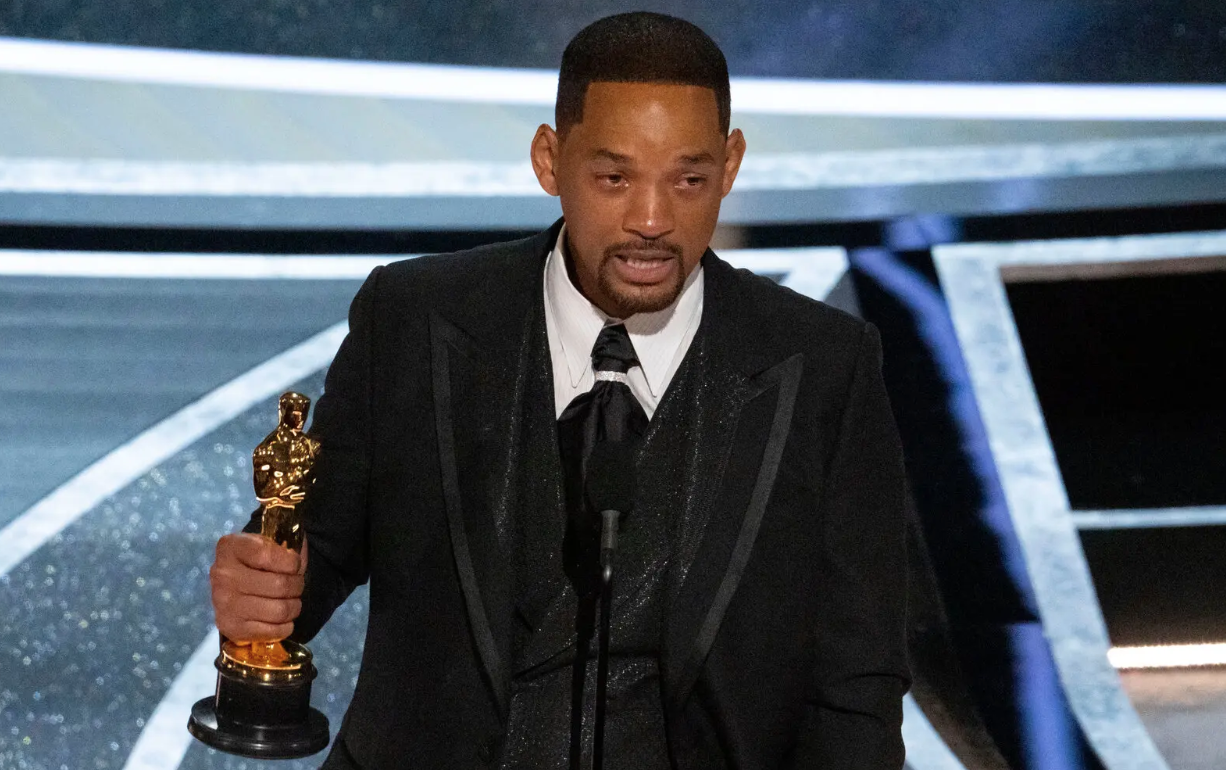
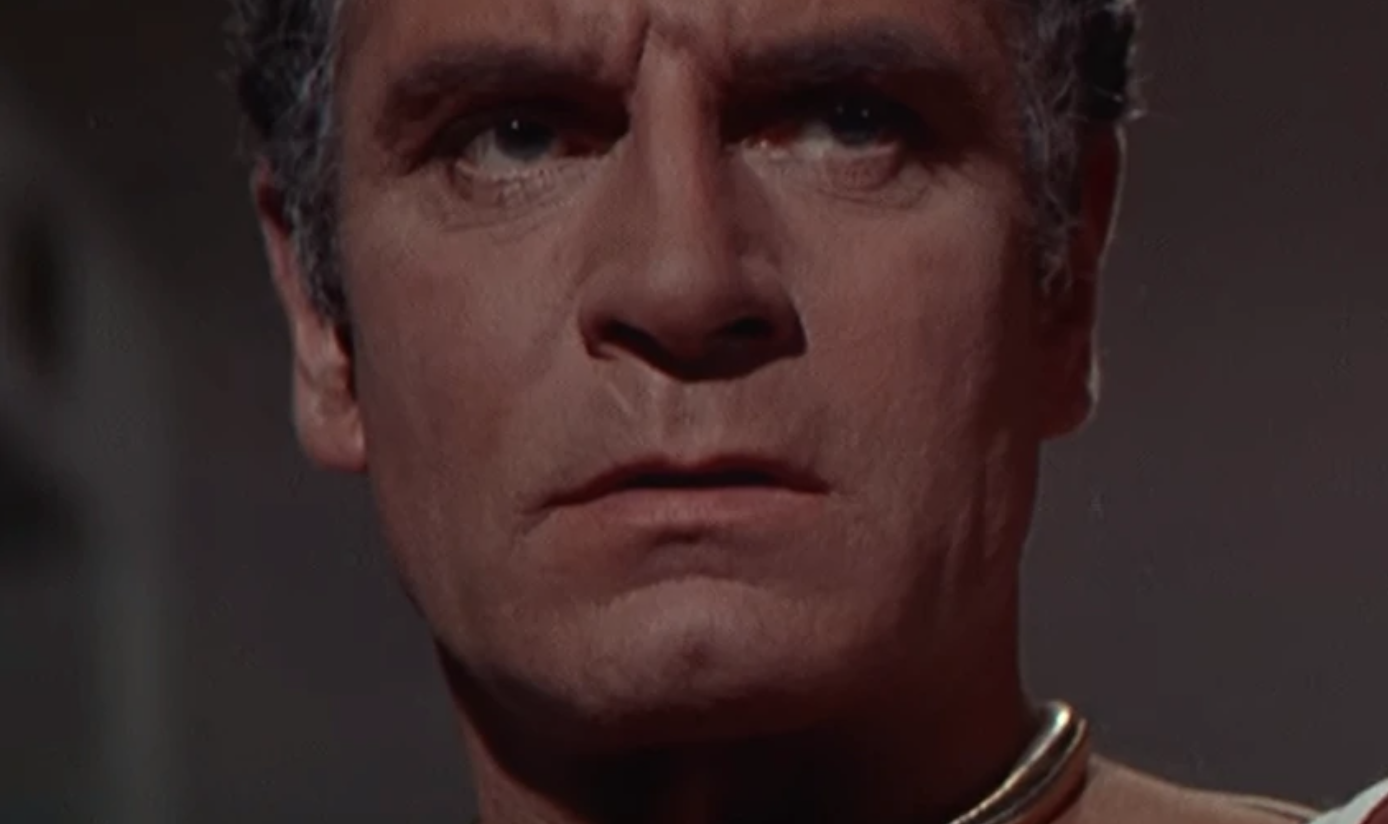
Jada Pinket is abusing her husband, Will Smith. This is what it looks like when a man is abused and manipulated by a woman. pic.twitter.com/PP6gV3F1mN
— THE FALL OF IDEALS 15 YEAR CELEBRATION TOUR! (@philthatremains) April 8, 2022
Pronoun Monsters on Maple Street
I was sorry to read the Daily Beast‘s 4.8.22 story about Ezra Miller’s erratic and disturbing behavior. Not just because Miller’s career may be in serious jeopardy, but because of the following sentence:
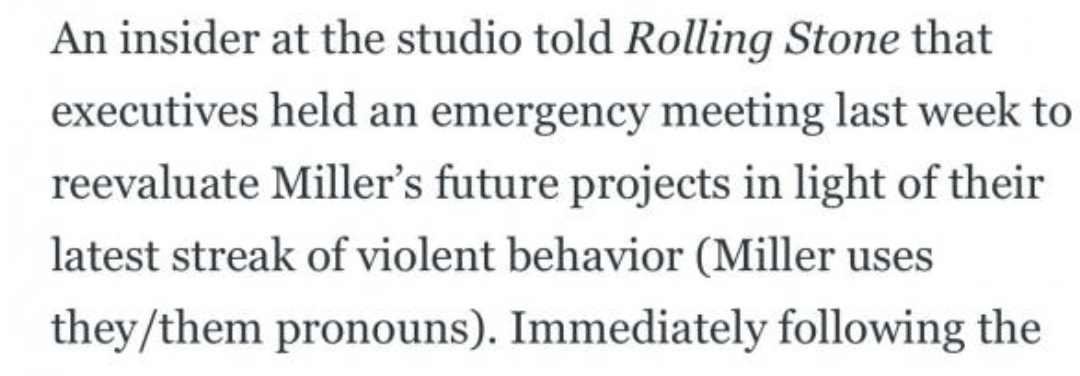
I’m sorry but something snapped inside when I was confronted with plural pronouns (they/them) that described (or alluded to) both Warner Bros. executives and Miller within the same sentence.
The old pronoun system (the one I’ve adhered to for several decades on this planet) calls for they/them to be used in the case of a group of humans within any social context. The new pronoun system insists on they/them also being used for individuals who identify as they/them gender whatevers.
For me, the use of conflicting, contrary applications of they/them within a single sentence violates a fundamental standard of descriptive clarity — a violation of a system that speakers of the English language have relied upon for centuries, for God’s sake. Sorry, but I’m suddenly finding this intolerable. I feel as if electrodes are attached to my damp ankles. I can feel jagged friction sparks in my brain. And all due to a single Daily Beast sentence written by Kyndall Cunningham.
I know this sounds abrupt but all of a sudden the pronoun thing — a re-ordering of the English language due to political activism on the part of one-half of 1% of the population, and driven by an attempt to show respect and establish boundaries that will benefit the ambiguous gender-fluid community — strikes me as fundamentally INSANE, or at least in this context.
Say it loud and proud: We cannot and must not use they/them to refer to an individual and a group of people within a single sentence.
We’re living in a world in which…how to put this?… pronouns have broken out of their cages and are running wild. I am sitting inside a nighttime campsite perimeter, lit by a small fire, and the wild, unruly pronouns are like wolves howling in the woods and getting closer and closer to the campsite.
The wokester left has become a diseased cult, and I say this as a mild-mannered left-center moderate.
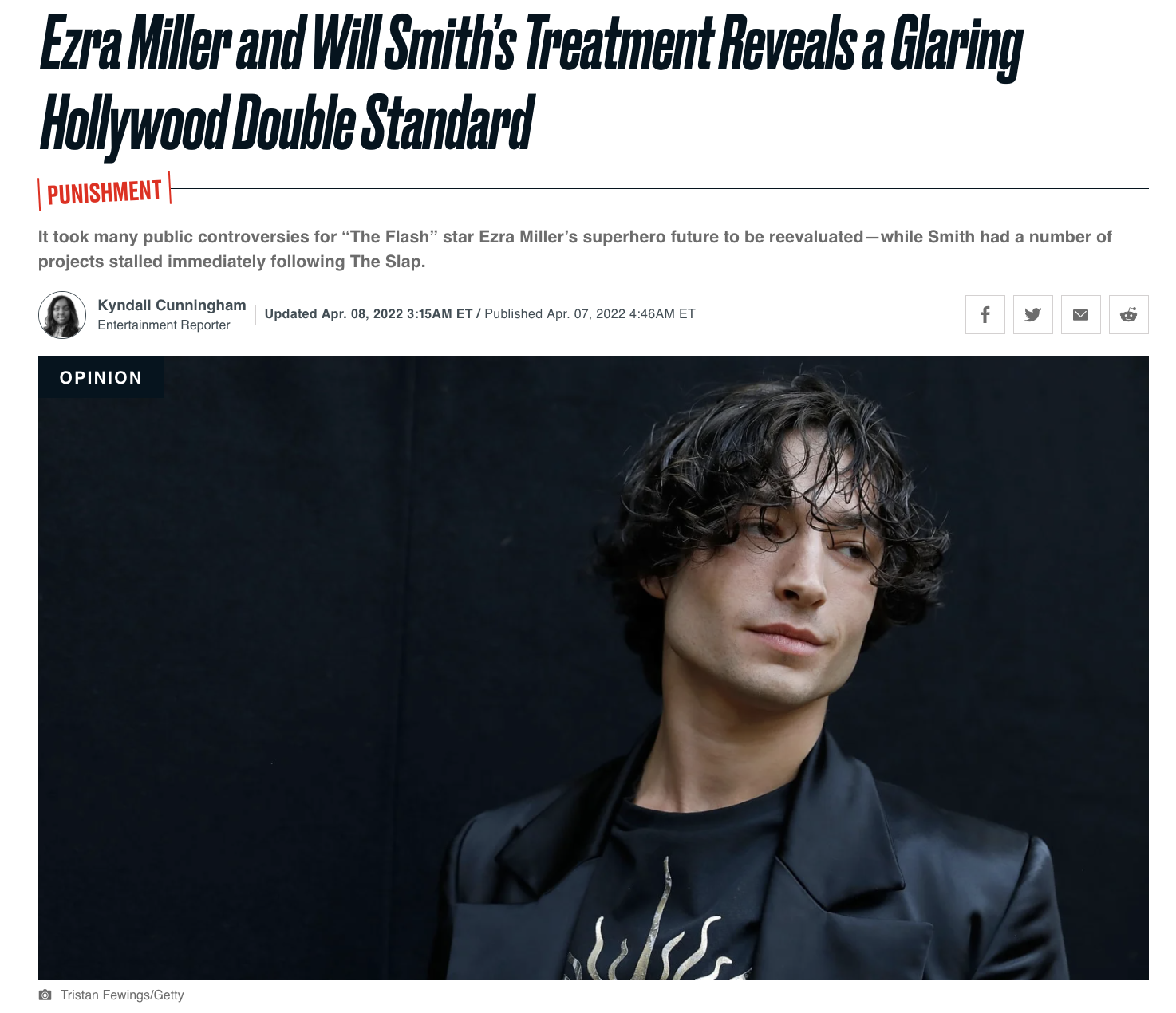
John Ortiz’s Perfect Scene
…in Silver Linings Playbook is perfectly captured by this hand-smothering, squashed-face sculpture. Truth be told, it’s what I feel like half the time. At times I’m the hand; other times I’m the face. I know it sounds fucked up, but what do you want me to do, lie?

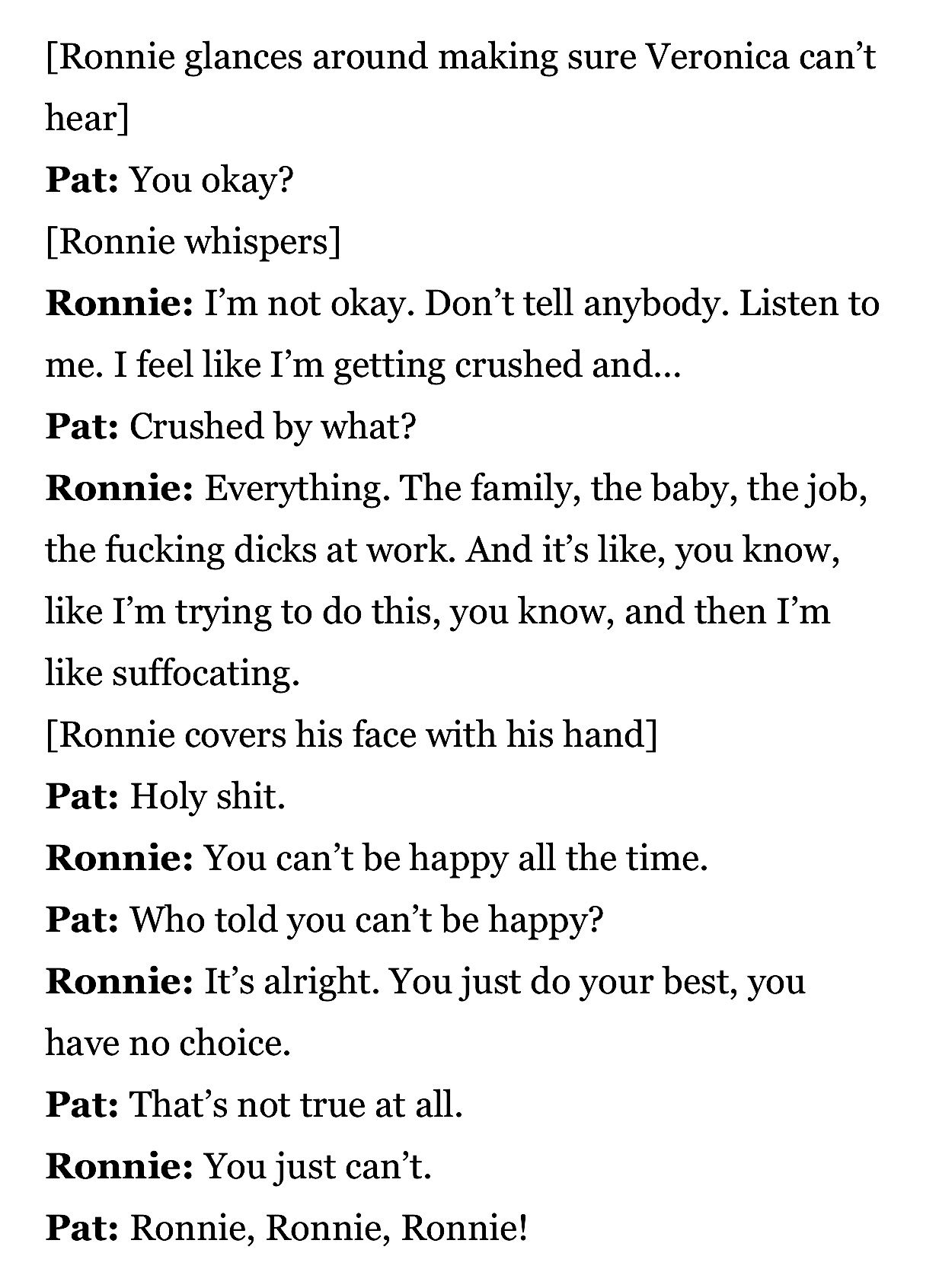
Spectrum Conspiracy As Imagined by William S. Burroughs
Two tech crises in rapid succession have disrupted the HE force field.
The day before yesterday HE’s Sonos player went awry. You don’t want to know the particulars but it took two longish tech-support phone calls over the course of 24 hours to fix the damn thing. The first tech person was an idiot; the second was smart and enterprising.
Shortly after the Sonos issue was resolved the whole wifi system went belly up. After all kinds of Spectrum tech-support agony by way of trial-and-error, it became clear that the Spectrum-provided router (five or six years old) had suddenly refused to sync. These things happen — sometimes a device just gets tired and weary and stops working properly. You just have to man up turn the other cheek.
I was told that the fastest remedy would be to go down to the WeHo Spectrum office and switch-out the malfunctioning router for a newbie. I was given an appointment time (11 am) and an appointment code. When I got there I punched in the code on the welcome screen, and of course they had no record of my having any such appointment. (The Spectrum phone-tech guy had dropped the ball.)
At first the in-store Spectrum guy (Asian, glasses, chubby) said they couldn’t help me unless my name was “in the system.” But I was told I had an appointment at 11am, I said. In any event I’m here, I pleaded, and I have the broken router. There are only four or five customers waiting right now — can’t you just slip me in when there’s an opening? Chubby spectacles shrugged his shoulders, repeated the line about “the system” blah blah.
I went to a nearby Jamba Juice and asked Spectrum tech support for advice, and they said “oh, the chubby bespectacled guy can help you…just sign in as a guest.” Which I did. I was given a new router (more Star Trek-y than the old one). I brought it home, powered it up and plugged in two identical yellow ethernet cables into two receptacles, one marked “ethernet” and the other marked “internet.”
Of course nothing has changed — the wifi is still on the fritz.
I have, however, arranged for a Spectrum engineer to visit tomorrow morning (Friday, 4.8). He/she will presumably fix the whole situation.
Oh, and by the way: The L.A. Water and Power guys turned the water off for eight hours today. That helped.
Friday, 4.8 update (6:10 am): HE is further perplexed by the strange inability of my iPhone 12 Max Pro to load web pages solely on the strength of AT&T’s normal WeHo air. (My usual home-generated wifi signal will be flat until the Spectrum repair guy arrives later this morning.) We all understand that individual carrier connectivity is always a bit slower than home or business-generated wifi, but right now HE’s AT&T signal (three bars) is anemic — it’s like being in the middle of the Sonoran desert.
Madness, Thy Name Is Cronenberg
Festival guy to World of Reel‘s Jordan Ruimy about David Cronenberg’s Crimes of the Future: “If people thought Crash was divisive back in ’96, this is going to create way more chaos and controversy for sure. The last 20 minutes are a very tough sit. I expect walk-outs, faintings and real panic attacks (I almost had one myself!) at the Lumière theatre. No hyperbole, I promise.”
“Lea Seydoux’s role is way too bonkers and RADICAL to contend for a Cannes Best Actress award in my book, but I’d love to be proven wrong. I see no precedent in Cannes for a performance of that caliber or genre gaining momentum with a jury…I mean. Seydoux basically plays a (very oft-naked) Gina Pane-like artist of the near future.”
Synopsis: “Saul Tenser (Viggo Mortensen) is a beloved performance artist who has embraced Accelerated Evolution Syndrome, sprouting new and unexpected organs in his body. Along with his partner Caprice (Lea Seydoux), Tenser has turned the removal of these organs into a spectacle for his loyal followers to marvel at in real-time theatre. But with both the government and a strange subculture taking note, Tenser is forced to consider what would be his most shocking performance of all.”
Pic costars Kristen Stewart, Scott Speedman, Welket Bungué and Don McKellar.
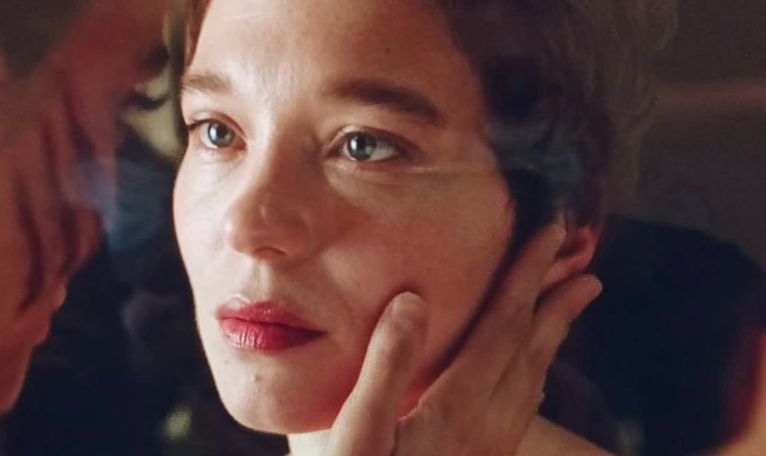
Alternate “Shining”
An undated article in Cinephiliabeyond.org, composed by Sven Mikulee, contains a rough, Stanley Kubrick-authored treatment for The Shining. It’s less than 70 pages long, and with a significantly different story than the one delivered by Kubrick’s 1980 film.
“All work and no play makes Jack a dull boy” is still there, but at the end of the day Wendy Torrance (Shelley Duvall) winds up killing Wacko Jacko (Jack Nicholson) with a big knife, gut-stabbing him.
And in a huge switch, Scatman Crowthers’ Dick Halloran, the Overlook Hotel’s chef, isn’t a kindly good guy trying to save Wendy and Danny from the malicious Jack. Instead he becomes some kind of demonic figure who’s in league with the ghost of Delbert Grady. Wendy kills Halloran also.
